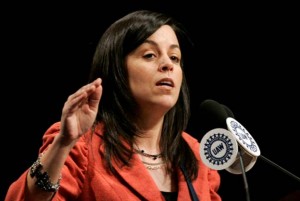Cindy Estrada has been named to one of the United Auto Workers Union’s most powerful posts, and as the new head of the UAW’s General Motors Department, the first woman ever in that roll, she will now face off against Mary Barra, the first woman to ever serve as GM CEO.
Estrada’s appointment comes as the first act by the UAW’s new President Dennis Williams, who was elected to that post at the union’s triennial convention this week.
The 45-year-old Estrada is a veteran member of the union’s board who, as a UAW vice president, has led the union’s efforts to organize workers at supplier plants and in the public sector. A graduate of the University of Michigan and a classroom teacher before joining the UAW’s organizing staff, Estrada’s appointment is unique since her resume doesn’t include full-time employment in the auto sector.
But once described by a UAW colleague as having that “old school fire,” Estrada’s ties to the labor movement run deep. She says she learned about the labor movement as a 7-year-old washing glasses in her dad’s bar, which was frequented by auto workers.
(The UAW’s new president faces some old and vexing problems. Click Here for more.)
In her new role, Estrada will oversee next year’s labor talks with General Motors, the largest automaker represented by the UAW. It will be a unique situation as the first woman to head the GM Department will go up against the first female GM CEO.
While Mary Barra has shown a willingness to change the way General Motors does business, she is also a tough business manager, so it will be a test for both union and management when talks get underway. Some critical issues will be on the table, including the two-tier wage structure that Detroit’s makers hail for helping make them competitive – but which union workers despise.
(GM takes a big hit, but CEO Barra’s performance wins praise. Click Here for the story.)
Estrada won’t be the only one trying to get rid of the two-tier system that pays veterans about $29 an hour in wages, while “new hires” are capped at $19.
But Norwood Jewel, the new head of the UAW’s Chrysler Department, may have a better opening to come up with an alternative. In fact, Fiat Chrysler CEO Sergio Marchionne last month said he also would like to eliminate the dual-pay approach – broadly hinting he’d prefer to tie blue-collar wages to the company’s profitability.
(Contentious vote brings dues hike to UAW for first time in decades. Click Here for the full story.)
While each of Detroit’s Big Three currently has a profit-sharing plan in place, the idea of pinning wages to earnings will clearly be a hard sell, especially to Jewel, so said Norwood Jewel, the a long-time GM worker who was one of the leaders in a bitter local strike at a General Motors plant in Flint in 1998 that all but brought the maker to its knees for more than a month.
Until now serving as the UAW’s regional director in Flint, Jewel moved up to vice president this week during the union’s convention. He will also be responsible for bargaining in the company’s agricultural implement department.
The convention comes as the union faces a variety of challenges and uncertainties – and as it struggles to reverse a disappointing setback when, earlier this year, workers at a Volkswagen plant in Chattanooga, Tennessee narrowly voted not to be organized by the UAW.
Moving ahead, new Autoworkers President Williams will have a number of new players in key roles. But there’ll be at least a few familiar faces in its top ranks. That includes Vice President Jimmy Settles, who will continue to head the union’s Ford department and also will be responsible for bargaining in the aerospace sector.
Gary Casteel, the UAW’s new Secretary Treasurer, was given responsibility for two other critical assignments, meanwhile, heading up both Transnational Organizing and the union’s relations with Mitsubishi Motors. The maker’s factory in Bloomington, Illinois is currently the only foreign-owned assembly plant represented by the UAW.
Casteel will likely be under the microscope in his new role, however. As the union’s regional director in the Southern U.S., he took an active role in the UAW’s failed organizing at the Volkswagen plant in Chattanooga. But he could have an inroad, at least with the European makers. Casteel was recently elected vice chairman of the Daimler AG global works council, which includes representatives from the maker’s plants around the world. The UAW would also like to organize Daimler’s Mercedes-Benz plant in Alabama.
“Solidarity will define our new leadership team,” Williams said. “Each of our new officers and Board members has risen through the ranks as workers for economic and social justice. Our new officer team will each focus on diverse assignments, but we all will work together in pursuit of the common goals our members have set for us at this convention.”
(Paul A. Eisenstein contributed to this report.)

